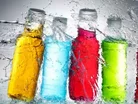Is there a healthy energy drink?

Written by William Rusnak
It’s 10:00am and you’re already slouching in your chair, dragging your feet between destinations, and can’t seem to focus on anything that anyone is saying. That small cup of coffee just isn’t going to cut it today. Staring at the fierce designs of the many energy drinks available to you, your heart is already racing at the thought of chugging down one of these miracle-workers. So which will it be?
There is an obscene variety of energy drinks on today’s market, which seemed to explode during the past decade. Choosing one may prove to be somewhat difficult, especially during those tired mornings.
Here are some things to consider:
Sugar
Let us first state the obvious by saying that refined sugar is terrible for you. It is a simple carbohydrate, which is the “easiest” form of fuel for the body. Eating it increases the sugar concentration in your blood (blood glucose) and discourages your body from using its natural mechanisms to maintain blood glucose (using stored sugar within liver and muscles or forcing the liver to construct sugar from proteins), thus resulting in your body using the “easy” sugars and storing anything left over as fat (weight gain). Did I mention decreased insulin sensitivity (lea ding to diabetes), absence of vitamins and minerals, increased triglycerides (a type of fat) in the blood, and of course, tooth decay?
Artificial Sweeteners
Generally sugar substitutes are synthetic, though some are naturally derived. They have been found be a great alternative to traditional refined sugar. They don’t increase your blood glucose levels, thus they help a person to avoid the negative effects attributed to sugar ingestion. Although there has been some concern about saccharin, an artificial sweetener, being linked to cancer in rats within a study during 1970, the National Cancer Institute has found no scientific evidence that supports the claim that any artificial sweeteners sold in the U.S. cause cancer.
Caffeine
Don’t let anyone fool you. Caffeine is reason you get any energy from an energy drink. Unless you have a diet absent of any vitamins and minerals, the other substances in energy drinks likely have a miniscule effect on energy levels.
Being the most widely used psychoactive drug in the world, caffeine is praised by many cultures. Aside from experiencing the obvious benefits of alertness, focus, and increased energy, drinkers of coffee also have been found to experience lower rates of liver, colon, and skin cancer, have a lower risk of gallstones, and be less likely to develop Parkinson disease. Some research has also suggested that drinking coffee regularly can decrease the incidence of Alzheimer disease, heart disease, strokes, and diabetes. Notice, however, that all the observed benefits within these studies have been attributed to drinking coffee. That said, there are hundreds of ingredients in coffee, including antioxidants, so it would not be logical to apply all of these benefits to caffeine alone. Therefore, energy drinks and soft drinks may only be providing a fraction of the healthy perks that come from drinking natural drinks like coffees or teas.
Overuse
Caffeine also has some obvious side-effects. Depending on the individual, consuming high levels of caffeine, somewhere above 300mg in a given day, can cause insomnia, nervousness, restless, irritability, nausea, fast or irregular heartbeat, muscle tremors, headaches, and even panic attacks. Furthermore, there have been reports of caffeine toxicity among adolescents in several countries. Obviously with many energy drinks containing 150mg of caffeine or more, it wouldn’t take more than consuming a few drinks to reach toxic levels. It also doesn’t help that energy drink advertisements generally appeal to adolescents, who are much more likely to abuse the drinks.
Conclusion
Is there a healthy energy drink? Considering the above information, the answer is: probably not. Coffees and teas definitely seem to be healthier with their naturalness and scientifically-proven benefits on health.
However, if you are going to choose an energy drink, it would be reasonable to choose one without sugar and to keep your intake to a reasonable amount, ingesting less than 300mg of caffeine a day.
About the Author
William Rusnak writes about healthcare technology, including medical practice management software and EHR software.



